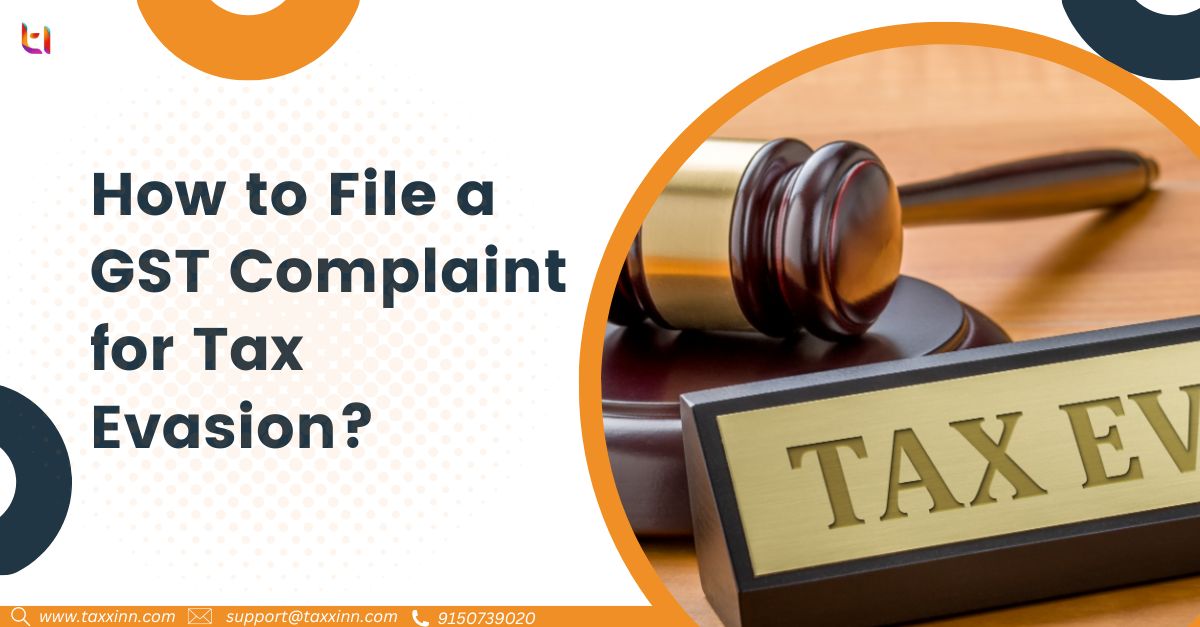GST
Goods and Services Tax is abbreviated as GST. The supply of products and services is subjected to a value-added tax that various countries, like India, Canada, Australia, and others, impose. By substituting other indirect taxes including sales tax, service tax, excise duty, and value-added tax, GST simplifies the tax system and promotes the creation of a single tax system.
The key objective of introducing the GST is to establish a clear and effective tax system that eliminates escalating duties and ensures a fair allocation of the cost of taxation. The implication of GST has enhanced tax compliance and benefited the country’s overall growth in the economy as well as development by enhancing tax administration and minimising tax evasion.
Tax Evasion
Tax evasion occurs when a particular individual or business consciously skips paying the proper amount of levies. It includes faking or disguising profit, falsifying deductions without evidence to back them up, failing to expose cash transactions, etc. Tax evasion is a serious crime that carries harsh penalties and illicit prosecution.
Managing a business necessitates extreme dedication to tax compliance, and the Goods and Services Tax (GST) is no exception. Registering a GST complaint is vital for ensuring responsibility on top of avoiding the severe allegations of tax evasion. In an attempt to keep your company on the right side of the law, we’re going to guide you through the process of filing a GST complaint for tax evasion in this article.
Methods of Tax Evasion
Through several types of fraudulent methods, one can prevent their taxable income. On the other hand, the Income Tax department had been equipped to catch the defaulters. Here are a few typical strategies for tax evasion:
- Providing misleading financial statements.
- Declaring a lesser income than what is earned.
- Neglecting to make payments for taxes on time.
- The justification for the incorrect exemption claims.
- Keeping the cash in other countries’ bank accounts.
Process of GST Complaint for Tax Evasion
The procedures to file a GST complaint must be followed to report tax evasion. By being aware of this procedure, you can prevent tax evasion as well as contribute to the establishment of a better and more balanced tax system. Now that we’ve got more information, let’s discover the way to make a complaint.
- Accumulate convincing proof: Accumulate strong evidence You must accumulate the applicable information and proof before lodging a complaint claiming GST tax evasion. The documentation proof could come in the type of contracts, bank statements, checks, bills, or any other kind of documents demonstrating GST evasion. Make certain that the evidence that supports the claims is accurate, applicable, and consistent in establishing inconsistent information.
- Determine the Appropriate governing bodies: You need to understand which governing bodies you ought to expose tax evasion to. In the majority of cases, you ought to submit your complaint to the appropriate GST department in the region you live in. To make sure that your issue is instantly resolved, you must find the applicable tax authority due to the fact every single country may have its own.
- Generate and put forward an accurate complaint: Prepare an accurate letter of complaint detailing the tax evasion in clear, transparent terms. To make the process of learning and investigating quicker, systematically provide the information. Complain using the proper procedures to the suitable levy authorities. This could consist of submitting the complaint physically at an authorised office, writing an email, or submitting an online form. Keep up with the instructions furnished carefully to make sure that your complaint gets resolved rapidly.
- Cooperation with governmental authorities and maintaining confidentiality: You need to support the tax authorities throughout their investigation after the complaint has been lodged. To support them to fulfil their inquiry, respond rapidly and with accurate details. To make an in-depth inquiry, cooperation is necessary. Regarding the tax evasion complaint, retain complete confidentiality. The confidentiality of the investigation is safeguarded and any potential disturbance is avoided through maintaining confidentiality.
Conclusion
In India, tax evasion is an extremely serious crime that needs to be avoided at all costs. Severe penalties may be imposed for ongoing tax evasion attempts. The drive for the establishment of a just and open tax system has to begin with the form of a GST complaint for tax evasion. Not only is the payment of levies obligatory by law, but it’s also ethically right and beneficial to society as a whole. At Taxxinn, we help you to get your GST return filed on time.
Related Reads:
What is GST Composition Scheme? Key Features and Eligibility Rules
Complete List of Legal Requirements Before Starting Your Company.
Documents Required for GST Registration for Sole Proprietorship Firms in India.


